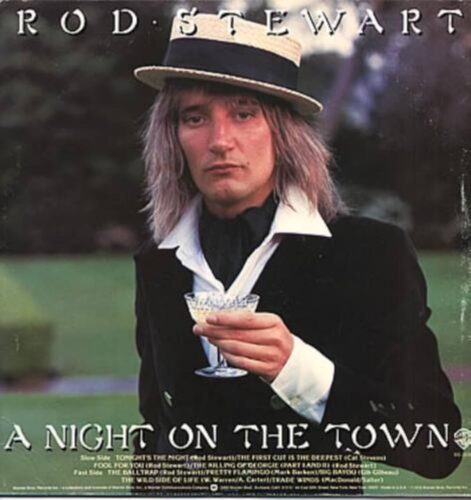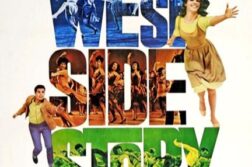
Most of us have a particular decade we align with in terms of music. For me, it’s the seventies, disco being the obvious draw based on some of my ‘stereotypical’ gay tendencies. I also liked the mellow tunes of Olivia Newton-John, James Taylor, and, I’ll admit it, John Denver.
In addition to disco, I also enjoyed pop music of the seventies because it was also punctuated with story songs. Most are maudlin tales of oft ill-fated souls. My heart broke each time I heard “Shannon,” an ode to a dog that swam out to sea, never turning back. Yes, beneath that omnipresent happy face of the seventies, there was a darker side in song.
Nothing captured me more than the story of Rod Stewart’s presumably fictional friend, George.
In 1976, Rod Stewart released “The Killing of Georgie (Part I and II),” a song that had me passing hours by my transistor AM radio, awaiting its next play.
At first, I listened just to see if I’d heard right or was I botching the lyrics, as I did to Elton’s “Benny and the Jets.” Rod’s single was the first I’d ever heard of someone singing about a gay man. Rod Stewart was the cool rock star who had topped the charts with “Maggie May” about an affair with an older woman and, later “Tonight’s the Night” about deflowering his “virgin child.” How could this rocker be singing a lament to a gay friend?
But there was no mistaking what I heard. The first verse makes their friendship clear: “In these days of changing ways…a story comes to mind of a friend of mine.” And then comes the acknowledgment—not an outing. It’s too matter of fact, casual, wholly accepting. “Georgie boy was gay, I guess. Nothin’ more or nothin’ less.”
This “nothin’” was everything. I was a confused tween, not aware enough about my gayness to even be closeted. All I knew was I couldn’t be myself. But could I? Here was Rod Stewart, unabashedly telling anyone who would listen he was friends with a gay man. It’s important that he describes George as “the kindest guy I ever knew.”
I was listening to something remarkable. It would become a song I could never hear as background music, one I always had to listen to the whole way through.
Ah, if only I could stop after the second verse. Happy happy. So seventies. If only the song turned out more “Tie a Yellow Ribbon” and less “American Pie.”
Released as a single from his album A Night on the Town, the follow-up to “Tonight’s the Night,” “The Killing of Georgie” hit number two on the charts in Britain, but only reached number thirty in the U.S. and 33 in Canada where I lived at the time. The lower charting meant longer waits by my radio. I was twelve, and I didn’t dare buy the single or even disguise my voice to call the station to make a request. All I’d ever heard was that gays were mentally ill perverts. I’d seen comedians get easy laughs with limp-wristed, lisping impersonations. I’d learned “fag” was the most vicious word to spew at someone on the playground. Rod’s imaginary friend became mine, too.
The happy arc continues enough to explain that, after coming out to his parents didn’t go well, Georgie Boy moved to New York City, found acceptance—adoration, even—and fell in love.
And then…
He died.
Walking home at night, “arm in arm” with his lover, he is ambushed by some thugs, one of whom has a switchblade and “pushed his luck a little too far.” What follows is some sugar coating, Georgie’s own advice as his legacy: basically, live your life. Part I ends with a resolute Rod repeating, “Georgie was a friend of mine.”
Every time I played the song, my brain did somersaults, my stomach got tied in knots. Gay was okay, at least to a rocker. This was affirmation, long before “It gets better.” And, because it was so long before, it also wasn’t okay. It got Georgie killed. The first gay guy I’d ever heard named and he was gay bashed. This haunted me.
Rod’s song gave me hope and fear. But the fear for this shy guy who wound up spending adolescence in East Texas proved greater. While I could live my life, it might mean rejection from family, something most of us fretted about.
Authentic living could mean early death, a message reframed less than a decade later with the AIDS crisis, the time when I finally did come out. One fear, however, didn’t replace the other. It just compounded matters. Living in Los Angeles, I thought of Georgie many a night as I walked the streets from the gay bars in West Hollywood to my car, each block seeming darker and farther from the relative safety of Santa Monica Boulevard.
Georgie came to mind again when Matthew Shepard died from an attack in Wyoming in 1998 and when Aaron Webster was swarmed and murdered in the city I next moved to, Vancouver, in 2001.
Part II of “The Killing of Georgie” is a mournful coda, Rod’s grief underscored by his signature raspy vocals. It’s basically a repeated chant, the kind of stuck-in-place thinking when we can’t let go. “Oh, Georgie, stay. Don’t go away.” A touching tribute becomes utterly heartbreaking.
The song is chock full of firsts for me: First use of gay in a positive way, first acknowledgment of gay friendship, first mention of cruising, first gay bashing, first time hearing a man express grief. To me, this will always be Rod Stewart’s crowning work, far stronger than his number one singles “Tonight’s the Night” (about what may be statutory rape), and “Da Ya Think I’m Sexy?” (about arrogant strutting).
48 years on, I still revisit “The Killing of Georgie.” I lean into the first verses. I still believe Georgie was a friend of mine.

Gregory Walters is a full-time writer after stints as a lawyer, teacher and school principal. He is currently working on several novels while his writing has been published by The New York Times, Funny Times, The Globe and Mail, CBC, Sprudge, Next Avenue, Vancouver Is Awesome, Cottage Life, Junto Magazine, and Writer’s Digest. He posts weekly on his blog, Aging Gayly, and can be found on Instagram.






Discussion1 Comment
Wow!
Wow, wow, wow, I love this piece. Who among us, as gay men, doesn’t have something, some cultural reference, some piece of art, that came to us at a time we needed it most to make us feel, perhaps for the first time, we were okay just the way we were. I know, Georgie died a horrible, tragic death. But Rod clearly loved him, and remembered him, and paid tribute to him in this deeply personal song. That it touched you so deeply too says a lot about you and your unique perspective.
Thanks for sharing with us. Beautifully written.
And, by the way, I’ve never listened to the song because I’m not a huge fan of Rod Stewart. But I’ll definitely give it a listen now.